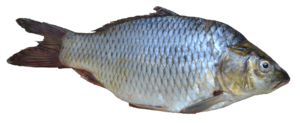Olive barb facts for kids
Quick facts for kids Olive barb |
|
|---|---|
 |
|
| Conservation status | |
| Scientific classification |
|
| Kingdom: | Animalia |
| Phylum: | Chordata |
| Class: | Actinopterygii |
| Order: | Cypriniformes |
| Family: | Cyprinidae |
| Subfamily: | Barbinae |
| Genus: | Systomus |
| Species: |
S. sarana
|
| Binomial name | |
| Systomus sarana (F. Hamilton, 1822)
|
|
| Script error: The function "autoWithCaption" does not exist. | |
| Synonyms | |
|
Cyprinus sarana Hamilton, 1822 |
|
Script error: No such module "Check for conflicting parameters".
The olive barb (Systomus sarana) is a type of freshwater fish found in many countries across Asia. These include Afghanistan, India, Nepal, Bangladesh, Pakistan, Bhutan, Sri Lanka, Thailand, and Myanmar. It's known for its olive-green color.
This fish can grow quite large, sometimes up to 42 centimeters (about 16.5 inches) long! While it's not very popular as a pet in aquariums, it's an important fish for local fishing in some areas, especially in Bangladesh.
Contents
Discovering the Olive Barb
The olive barb is a species of cyprinid fish. This means it belongs to a large family of freshwater fish that includes carps and minnows. They are often found in rivers, streams, lakes, and calm backwaters.
Olive barbs are quite adaptable. They can even live in water that is a little bit salty. This makes them able to survive in different environments.
Where Olive Barbs Live
Olive barbs are native to a wide range of countries in Asia. You can find them in:
They prefer freshwater habitats like rivers, streams, and lakes. They also live in calmer areas like backwaters, which are parts of a river where the water flow is slow.
What Olive Barbs Eat
Olive barbs are not picky eaters! They have a varied diet, which means they eat many different things. Their meals often include:
- Aquatic insects (bugs that live in water)
- Smaller fish
- Algae (tiny plant-like organisms)
- Shrimps
This diverse diet helps them find food in many different places.
Life Cycle and Habits
Olive barbs are social fish. They often swim together in groups called schools. These schools can be small, with just four or five fish, or much larger, with dozens of fish swimming together. This schooling behavior helps them stay safe from predators.
When it's time to lay eggs, olive barbs look for special places. They usually spawn, or reproduce, in running waters. They like to lay their eggs among submerged boulders (rocks under the water) and thick underwater plants. This helps protect the eggs until they hatch.
Olive Barbs and People
The olive barb is important for local fishing in some areas. People catch them for food, making them a part of local commercial fisheries. They are also sometimes sought after by people who enjoy fishing for sport.
However, the olive barb is not very popular in the aquarium trade. This means you won't often see them sold as pets for home aquariums.
 | Charles R. Drew |
 | Benjamin Banneker |
 | Jane C. Wright |
 | Roger Arliner Young |


